

Meister Eckhart. Eckhart came into prominence during the Avignon Papacy, at a time of increased tensions between monastic orders, diocesan clergy, the Franciscan Order, and Eckhart's Dominican Order of Preachers.
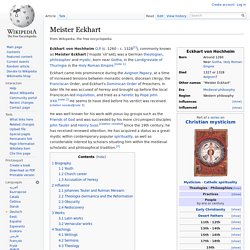
In later life he was accused of heresy and brought up before the local Franciscan-led Inquisition, and tried as a heretic by Pope John XXII. [note 2] He seems to have died before his verdict was received. [citation needed][note 3] He was well known for his work with pious lay groups such as the Friends of God and was succeeded by his more circumspect disciples John Tauler and Henry Suso. [citation needed] Since the 19th century, he has received renewed attention. Meister Eckhart.
Eckhart came into prominence during the Avignon Papacy, at a time of increased tensions between the Franciscan Order and Eckhart's Dominican Order of Preachers.
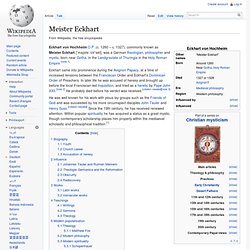
In later life he was accused of heresy and brought up before the local Franciscan-led Inquisition, and tried as a heretic by Pope John XXII. [note 2] He probably died before his verdict was received. [citation needed][note 3] He was well known for his work with pious lay groups such as the Friends of God and was succeeded by his more circumspect disciples John Tauler and Henry Suso. [citation needed] Since the 19th century, he has received renewed attention. Paracelsus. Paracelsus (/ˌpærəˈsɛlsəs/; born Philippus Aureolus Theophrastus Bombastus von Hohenheim, 11 November or 17 December 1493 – 24 September 1541) was a Swiss German[3] Renaissance physician, botanist, alchemist, astrologer, and general occultist.[4] He founded the discipline of toxicology.[5] He is also known as a revolutionary for insisting upon using observations of nature, rather than looking to ancient texts, in open and radical defiance of medical practice of his day.[5] He is also credited for giving zinc its name, calling it zincum.[6][7] Modern psychology often also credits him for being the first to note that some diseases are rooted in psychological illness.[8] His personality was stubborn and independent.
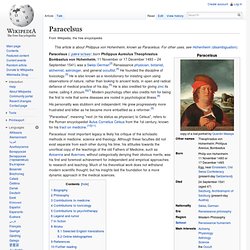
He grew progressively more frustrated and bitter as he became more embattled as a reformer.[9] Paracelsus' most important legacy is likely his critique of the scholastic methods in medicine, science and theology. Thomas à Kempis. Monument on Mount Saint Agnes in Zwolle "Here lived Thomas van Kempen in the service of the Lord and wrote On the Imitation of Christ, 1406–1471" Thomas à Kempis, C.R.S.A.
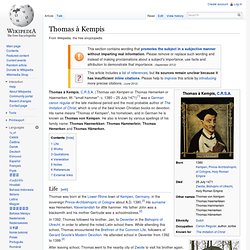
(Thomas van Kempen or Thomas Hemerken or Haemerken, litt. "small hammer"; c. 1380 – 25 July 1471)[1] was a German canon regular of the late medieval period and the most probable author of The Imitation of Christ, which is one of the best known Christian books on devotion. Johannes Kepler. Johannes Kepler (German: [ˈkʰɛplɐ]; December 27, 1571 – November 15, 1630) was a German mathematician, astronomer, and astrologer.
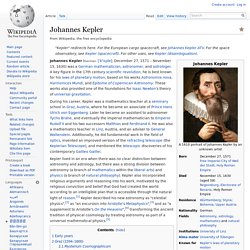
A key figure in the 17th century scientific revolution, he is best known for his laws of planetary motion, based on his works Astronomia nova, Harmonices Mundi, and Epitome of Copernican Astronomy. These works also provided one of the foundations for Isaac Newton's theory of universal gravitation. Jakob Böhme. Jakob Böhme (/ˈbeɪmə, ˈboʊ-/;[1] 1575 – November 17, 1624) was a German Christian mystic and theologian.
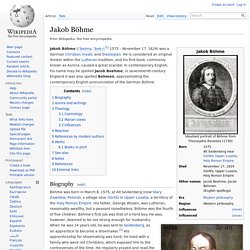
He is considered an original thinker within the Lutheran tradition, and his first book, commonly known as Aurora, caused a great scandal. In contemporary English, his name may be spelled Jacob Boehme; in seventeenth-century England it was also spelled Behmen, approximating the contemporary English pronunciation of the German Böhme. Biography[edit] Jakob Böhme (anonymous portrait) Böhme was born in March 8, 1575, at Alt Seidenberg (now Stary Zawidów, Poland), a village near Görlitz in Upper Lusatia, a territory of the Holy Roman Empire. In 1610 Böhme experienced another inner vision in which he further understood the unity of the cosmos and that he had received a special vocation from God.
Georg Wilhelm Friedrich Hegel. The birthplace of Hegel in Stuttgart, which now houses The Hegel Museum.
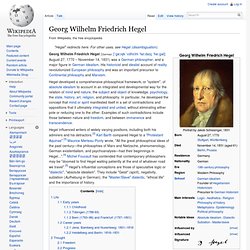
Friedrich Nietzsche. Friedrich Wilhelm Nietzsche (/ˈniːtʃə/[1] or /ˈniːtʃi/;[2] German: [ˈfʁiːdʁɪç ˈvɪlhɛlm ˈniːt͡sʃə]; 15 October 1844 – 25 August 1900) was a German philosopher, cultural critic, poet, composer and Latin and Greek scholar.
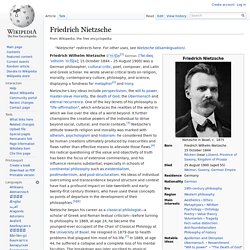
He wrote several critical texts on religion, morality, contemporary culture, philosophy and science, displaying a fondness for metaphor[3] and irony. Nietzsche's key ideas include perspectivism, the will to power, the death of God, the Übermensch and eternal recurrence. One of the key tenets of his philosophy is "life-affirmation", which embraces the realities of the world in which we live over the idea of a world beyond. Nietzsche began his career as a classical philologist—a scholar of Greek and Roman textual criticism—before turning to philosophy.
In 1869, at age 24, he became the youngest-ever occupant of the Chair of Classical Philology at the University of Basel. Arthur Schopenhauer. Life[edit] Schopenhauer's birthplace house, ul.
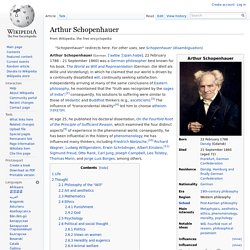
Św. Ducha (formerly Heiligegeistgasse) In 1814, Schopenhauer began his seminal work The World as Will and Representation (Die Welt als Wille und Vorstellung). He finished it in 1818 and published it the following year. Georg Wilhelm Friedrich Hegel.